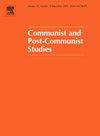解释中欧和东欧获得公民身份的途径
IF 1.3
4区 社会学
Q3 INTERNATIONAL RELATIONS
引用次数: 1
摘要
在国际移民和右翼民粹主义兴起的背景下,关于公民政策的辩论愈演愈烈。本文试图解释为什么一些中欧和东欧国家对非族裔移民采用了比其他国家更具包容性的国籍规则。该分析涵盖了1990年至2014年期间,重点关注四个因素:政府的左右意识形态立场、极右翼政党的选举实力、外籍/亲属少数民族人口的规模以及少数民族问题的重要性。使用模糊集定性比较分析,文章发现,强大的极右翼政党、重要的少数民族问题和大量的外籍/亲属少数民族人口都对中欧和东欧的限制性公民政策做出了贡献。然而,这些因素都不是必要的或充分的。与此同时,在那些极右翼政党未能在选举中取得重要成功,少数民族问题相对微不足道的国家,采取了包容性的国籍准入规则。本文章由计算机程序翻译,如有差异,请以英文原文为准。
Explaining access to citizenship in Central and Eastern Europe
Against the backdrop of international migration and the rise of right-wing populism, debates on citizenship policies intensified. This article seeks to explain why some Central and Eastern European countries adopted more inclusive access to nationality rules for non-ethnic immigrants than others. Encompassing the period from 1990 to 2014, the analysis focuses on four factors: left–right ideological position of governments, electoral strength of far-right parties, the size of expatriate/kin minority populations, and the importance of national minority issues. Using fuzzy-set Qualitative Comparative Analysis, the article found that strong far-right parties, important national minority issues, and sizable expatriate/kin minority populations all contributed to restrictive citizenship policies in Central and Eastern Europe. However, none of these factors were necessary or sufficient. Meanwhile, inclusive access to nationality rules were adopted in those countries where far-right parties failed to register important electoral successes and national minority issues were relatively insignificant.
求助全文
通过发布文献求助,成功后即可免费获取论文全文。
去求助
来源期刊

Communist and Post-Communist Studies
Multiple-
CiteScore
1.90
自引率
0.00%
发文量
23
期刊介绍:
Communist and Post-Communist Studies is an international journal covering all communist and post-communist states and communist movements, including both their domestic policies and their international relations. It is focused on the analysis of historical as well as current developments in the communist and post-communist world, including ideology, economy and society. It also aims to provide comparative foci on a given subject by inviting comments of a comparative character from scholars specializing in the same subject matter but in different countries.
 求助内容:
求助内容: 应助结果提醒方式:
应助结果提醒方式:


